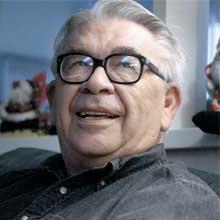Vine Deloria
| Vine Deloria Jr. | |
|---|---|
 |
|
| Born |
Vine Victor Deloria Jr. March 26, 1933 Martin, South Dakota |
| Died | November 13, 2005 (aged 72) Golden, Colorado |
| Nationality | Standing Rock Sioux, American |
| Theological work | |
Vine Victor Deloria Jr. (March 26, 1933 – November 13, 2005) was a Native American author, theologian, historian, and activist. He was widely known for his book Custer Died for Your Sins: An Indian Manifesto (1969), which helped generate national attention to Native American issues in the same year as the Alcatraz-Red Power Movement. From 1964 to 1967, he had served as executive director of the National Congress of American Indians, increasing tribal membership from 19 to 156. Beginning in 1977, he was a board member of the National Museum of the American Indian, which now has buildings in both New York City and Washington, DC. He was influential in the development of what scientific critics called American Indian creationism, but which American Indians referred to as defenses against scientific racism.
Deloria began his academic career in 1970 at Western Washington State College at Bellingham, Washington. He became Professor of Political Science at the University of Arizona (1978–1990), where he established the first master's degree program in American Indian Studies in the United States. In 1990, Deloria taught at the University of Colorado Boulder until 2000, when he returned to Arizona and taught at the College of Law.
Vine Deloria Jr. was born in 1933, in Martin, South Dakota, near the Oglala Lakota Pine Ridge Indian Reservation. He was the son of Barbara Sloat (née Eastburn) and Vine Victor Deloria, Sr. (1901–1990). His father studied English and Christian theology and became an Episcopal archdeacon and missionary on the Standing Rock Indian Reservation. His father transferred his and his children's tribal membership from the Yankton Sioux to Standing Rock. Vine Sr.'s sister Ella Deloria (1881–1971) was an anthropologist. Vine Jr.'s paternal grandfather was Tipi Sapa (Black Lodge), also known as Rev. Philip Joseph Deloria, an Episcopal priest and a leader of the Yankton band of the Dakota Nation. His paternal grandmother was Mary Sully, daughter of Alfred Sully, a general in the American Civil War and Indian Wars and his French-Yankton wife; and granddaughter of painter Thomas Sully.
...
Wikipedia
